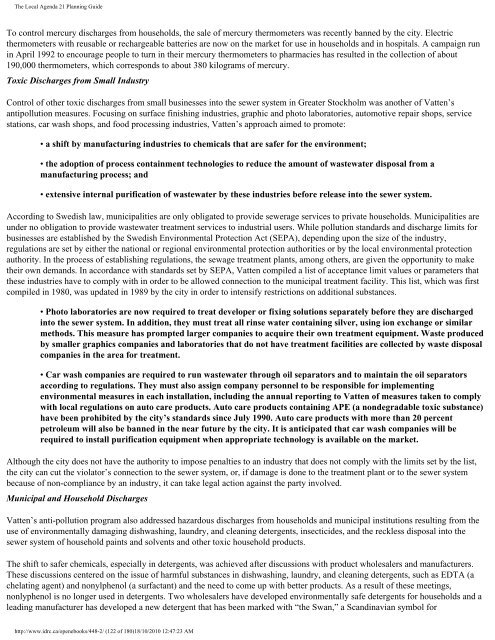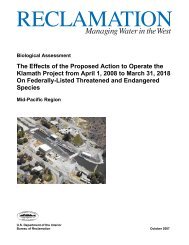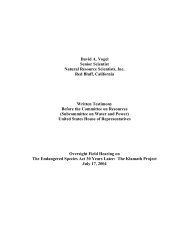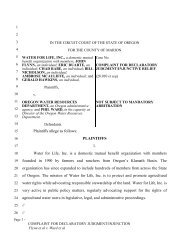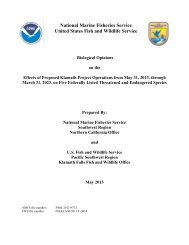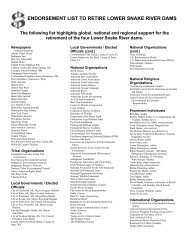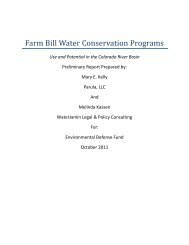The Local Agenda 21 Planning Guide - Democrats Against UN ...
The Local Agenda 21 Planning Guide - Democrats Against UN ...
The Local Agenda 21 Planning Guide - Democrats Against UN ...
Create successful ePaper yourself
Turn your PDF publications into a flip-book with our unique Google optimized e-Paper software.
<strong>The</strong> <strong>Local</strong> <strong>Agenda</strong> <strong>21</strong> <strong>Planning</strong> <strong>Guide</strong><br />
To control mercury discharges from households, the sale of mercury thermometers was recently banned by the city. Electric<br />
thermometers with reusable or rechargeable batteries are now on the market for use in households and in hospitals. A campaign run<br />
in April 1992 to encourage people to turn in their mercury thermometers to pharmacies has resulted in the collection of about<br />
190,000 thermometers, which corresponds to about 380 kilograms of mercury.<br />
Toxic Discharges from Small Industry<br />
Control of other toxic discharges from small businesses into the sewer system in Greater Stockholm was another of Vatten’s<br />
antipollution measures. Focusing on surface finishing industries, graphic and photo laboratories, automotive repair shops, service<br />
stations, car wash shops, and food processing industries, Vatten’s approach aimed to promote:<br />
• a shift by manufacturing industries to chemicals that are safer for the environment;<br />
• the adoption of process containment technologies to reduce the amount of wastewater disposal from a<br />
manufacturing process; and<br />
• extensive internal purification of wastewater by these industries before release into the sewer system.<br />
According to Swedish law, municipalities are only obligated to provide sewerage services to private households. Municipalities are<br />
under no obligation to provide wastewater treatment services to industrial users. While pollution standards and discharge limits for<br />
businesses are established by the Swedish Environmental Protection Act (SEPA), depending upon the size of the industry,<br />
regulations are set by either the national or regional environmental protection authorities or by the local environmental protection<br />
authority. In the process of establishing regulations, the sewage treatment plants, among others, are given the opportunity to make<br />
their own demands. In accordance with standards set by SEPA, Vatten compiled a list of acceptance limit values or parameters that<br />
these industries have to comply with in order to be allowed connection to the municipal treatment facility. This list, which was first<br />
compiled in 1980, was updated in 1989 by the city in order to intensify restrictions on additional substances.<br />
• Photo laboratories are now required to treat developer or fixing solutions separately before they are discharged<br />
into the sewer system. In addition, they must treat all rinse water containing silver, using ion exchange or similar<br />
methods. This measure has prompted larger companies to acquire their own treatment equipment. Waste produced<br />
by smaller graphics companies and laboratories that do not have treatment facilities are collected by waste disposal<br />
companies in the area for treatment.<br />
• Car wash companies are required to run wastewater through oil separators and to maintain the oil separators<br />
according to regulations. <strong>The</strong>y must also assign company personnel to be responsible for implementing<br />
environmental measures in each installation, including the annual reporting to Vatten of measures taken to comply<br />
with local regulations on auto care products. Auto care products containing APE (a nondegradable toxic substance)<br />
have been prohibited by the city’s standards since July 1990. Auto care products with more than 20 percent<br />
petroleum will also be banned in the near future by the city. It is anticipated that car wash companies will be<br />
required to install purification equipment when appropriate technology is available on the market.<br />
Although the city does not have the authority to impose penalties to an industry that does not comply with the limits set by the list,<br />
the city can cut the violator’s connection to the sewer system, or, if damage is done to the treatment plant or to the sewer system<br />
because of non-compliance by an industry, it can take legal action against the party involved.<br />
Municipal and Household Discharges<br />
Vatten’s anti-pollution program also addressed hazardous discharges from households and municipal institutions resulting from the<br />
use of environmentally damaging dishwashing, laundry, and cleaning detergents, insecticides, and the reckless disposal into the<br />
sewer system of household paints and solvents and other toxic household products.<br />
<strong>The</strong> shift to safer chemicals, especially in detergents, was achieved after discussions with product wholesalers and manufacturers.<br />
<strong>The</strong>se discussions centered on the issue of harmful substances in dishwashing, laundry, and cleaning detergents, such as EDTA (a<br />
chelating agent) and nonylphenol (a surfactant) and the need to come up with better products. As a result of these meetings,<br />
nonlyphenol is no longer used in detergents. Two wholesalers have developed environmentally safe detergents for households and a<br />
leading manufacturer has developed a new detergent that has been marked with “the Swan,” a Scandinavian symbol for<br />
http://www.idrc.ca/openebooks/448-2/ (122 of 180)18/10/2010 12:47:23 AM


